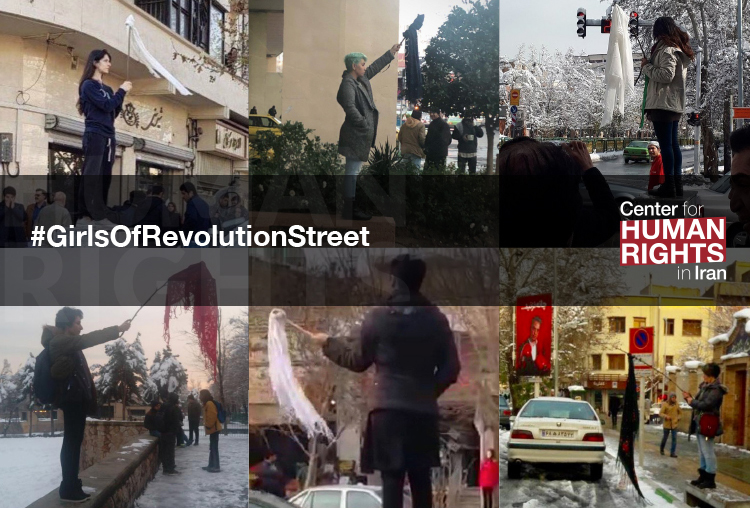CHRI – Police in Tehran have turned 29 people over to the judicial authorities for taking part in a growing campaign against forced hijab, the hardline Tasnim news agency reported on February 1, 2018. The detainees’ names have not been released.
 The report quoted a police statement claiming the arrested protestors had been “fooled” by the “White Wednesdays” campaign. White Wednesdays was launched by exiled journalist and civil rights activist Masih Alinejad to encourage Iranian women who oppose mandatory hijab to wear a white scarf on Wednesdays and share their images on the My Stealthy Freedom page on Facebook.
The report quoted a police statement claiming the arrested protestors had been “fooled” by the “White Wednesdays” campaign. White Wednesdays was launched by exiled journalist and civil rights activist Masih Alinejad to encourage Iranian women who oppose mandatory hijab to wear a white scarf on Wednesdays and share their images on the My Stealthy Freedom page on Facebook.
The latest protests began in late December 2017, after a photo of Vida Movahed went viral among Iranians, which showed her standing on a sidewalk platform on Revolution St. in Tehran waving her white scarf on a stick like a flag.
Since then dozens of women, as well as some men, have posted images in a similar pose on social media using the Farsi hashtag “Girls of Revolution St.”
“The Girls of Revolution St. and many others who in recent days have protested against forced hijab by removing their scarves in the open, are not connected with the White Wednesdays campaign or other Iranian groups and activists based abroad,” an Iranian civil rights activist told the Center for Human Rights in Iran (CHRI) on condition of anonymity.
“To suppress protests against forced hijab, which have always existed inside and outside Iran, the security and judicial establishment has accused domestic social movements of being guided from outside Iran.”
On January 29, Narges Hosseini was arrested in Tehran for mimicking Movahed’s pose. She remains in jail because her family could not afford the high bail amount set at $135,000 USD.
Movahed, 31, disappeared for a month after her photos appeared, resulting in Iranians expressing concern for her on social media with a hashtag translating to, “Where is the Girl from Revolution St?” English speakers followed suit with the hashtag, #Where_Is_She.
In late January, the Iranian human rights lawyer Nasrin Sotoudeh told CHRI that Movahed had been arrested and freed on bail.
Asked by reporters about the recent protests, Prosecutor General Mohammad Jafar Montazeri said on January 30, “I think this is a minor issue that our people are not paying any attention to.”
He added: “We have a population of about 80 million people and the vast majority of our women either wear the chador or have an appropriate hijab. In these circumstances, they will not allow the enemy to carry out its plans. It was a childish move for a young girl to take off her scarf in a place where people are living their normal lives and some people were assigned to post the films on the cyber network.”
“I think those who committed these acts did it mostly out of ignorance,” Montazeri continued. “Their emotions were stirred by foreign instigations. Most of our people are Muslim and observe religious laws. These actions do not have much of an impact. Anyone appearing on the street without a hijab is committing a crime and can be pursued by the law.”
Article 638 of Iran’s Islamic Penal Code states: “Women, who appear in public places and roads without wearing an Islamic hijab shall be sentenced to ten days to two months’ imprisonment or a fine of 50 thousand to five hundred rials.”
If protesters are also charged with national security violations, they can be put behind bars for many years.
 Shabtabnews In this dark night, I have lost my way – Arise from a corner, oh you the star of guidance.
Shabtabnews In this dark night, I have lost my way – Arise from a corner, oh you the star of guidance.


